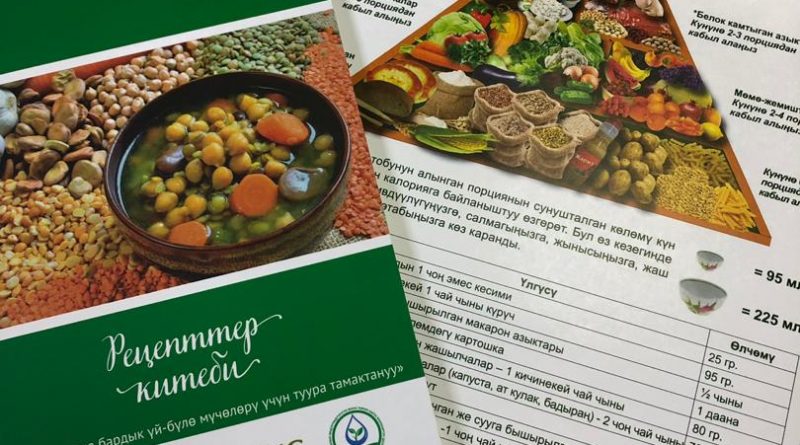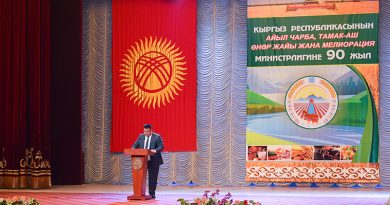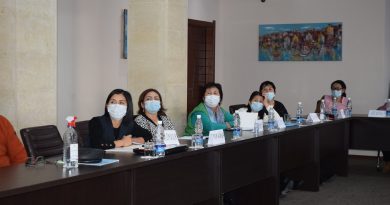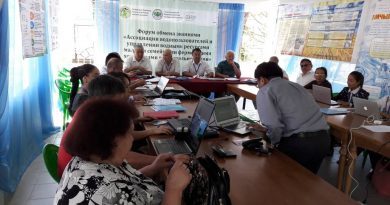Reproductive health, sex education and personal hygiene of teenage girls
On February 20, 2019, a round table entitled “Reproductive health, sexual education and personal hygiene of female adolescent” was held in Bishkek with the participation of representatives of the Ministry of Health of the KR, KEA, KSMA, KSM Institute for advanced studies, and development partners. Twenty-seven people took a part.
The purpose of the round table is: a debating on reproductive health, sanitation and hygiene, nutrition of teenage girls.
The event was moderated by Baktygul Ismailova, Chief Specialist of the Public Health Department of the Ministry of Health of the KR. She welcomed all the participants and noted that the organization of the round table is a very relevant event, since the health problems of teenage girls are very important, the future of our republic depends on their health, as in the near future they are pregnant women and mothers.
Nargiz Nazarova is a Chief independent specialist of the Ministry of Health of the Kyrgyz Republic on teenage girls, who made a presentation on the following topic: “Overview of the situation on the reproductive system of teenage girls in the Kyrgyz Republic” and presented an overview of the incidence of teenage girls in the Republic.
Adilet Muratov – “Growing Up” project manager, told about the implementation of project activities, making specific mention that 90 teachers were trained in sexual development and menstrual hygiene (SDMH) within the framework of the project. The trained teacher- instructors held mini-sessions for other teachers, parents and children at the level of their community, and various informational and cultural events were held in schools. 9184 people are informed about SDMH through project activities; 25,000 information materials were distributed to members of the local community. Within the project, a qualitative study of CHOICES was conducted. CHOICES is a gender norms program developed by “Save the Children” Fund and has been adapted in several countries.
The basic package for the SDMH of teenage girls was also presented:
- «Conversation with daughter» (brochure for parents)
- “Growing up” (brochure for teenage girls)
- “Teacher’s guide” (teacher’s guide)
- “Akylay grows up” (story)
Component 3 coordinator “Measures to improve the nutritional quality” of the project “Agricultural Productivity and Nutrition Improvement Project” under the Department of Water Resources and Land Improvement – Saykal Bozova made a presentation on the activities carried out under the component, spoke about the ongoing training of health workers of the pilot Ayilkov pilot (AA) project on the topics: “Infant and Young Child Feeding”, “Problems of Nutrition and anemia in teenage girls and WCBA”. Currently, the component implements its activities in 11 pilot and adjacent AA. Trained activists of rural health committees, while visiting households inform the population about key nutritional reports, etc. She also noted that under subcomponent 3.2, the purchase of iron and folic acid medicine for teenage girls and pregnant women is planned.
A representative of the program N. Navatova told about the planning of Mercy Corps activities in nutrition, sanitation and hygiene in pilot schools in Kyrgyz Republic. She noted that Mercy Corps is engaged in improving the infrastructure in schools, the activity is aimed at improving school nutrition, today it works in 500 schools of the Republic, and training of health workers and the population on nutrition is also conducted.
Saltanat Mamyrbayeva, Project Specialist for Sustainable Development of Rural Water Supply and Sanitation of the Community Development and Investment Agency (ARIS), presented the work of component 2 and noted that TOT for teachers, training for schoolchildren and extracurricular lessons on Water, Sanitation and Hygiene (WASH), using a three-star approach (hand washing practice, access to clean water, access to clean bathrooms, menstrual hygiene), the creation of WASH committees under the boards of trustees of schools.
A presentation on the “Impact of migration on the teenage girls’ health” was made by Jyldyz Isakova, Ph.D. in medicine, Associate Professor of the Obstetrics and Gynecology Department, KSMA. She noted in her speech the urgency of the problem of reproductive health and reproductive function, which are the most important indicators of public health, determining the quality of the rising generation, the nation’s gene pool.
The good health of the younger generation, including the reproductive one, is the potential for the economic and social development of the nation. At the same time, issues of proper organization of care for the vitality and health of the younger generation of girls, which is the most important task of modern domestic health care, are of particular relevance.
In the afternoon, work in small groups took place in three areas: reproductive health of teenage girls; sanitation and hygiene; nutrition.
The Reproductive Health Group, through efforts of not only medical professionals, with a particular focus on informing the population about the health of children and teenage girls, and to involve family members in the health of teenage girls everywhere, as well as young people who are important to health in the future. The participants made a wish about the resumption of school medicine, full time medical workers in schools, widespread information about prevention of iron deficiency anemia (IDA), provision of iron and folic acid for prevention of IDA, and not just for treatment, etc.
The participants of the second group on WASH problems, noted the importance of mapping on the work of WASH projects, mapping of regions covered by WASH activities, creation of WASH headquarters in schools as a part of board of trustees, involving all stakeholders on WASH issues, identifying vulnerable schools, families, villages on WASH, etc.
Participants of the third group on nutrition of teenage girls made a proposal to ban the harmful food sales (junk food like chips, cracker, sugary carbonated drinks, etc.), within 100 meters from the schools, the introduction of lunch boxes for teenagers, hot meals for 5-11 forms students, more attentive attitude to the nutrition of teenage girls in families, so that parents watch that teenagers (girl and boy) have breakfast, involve more of them in sports clubs, clubs, etc., and promote healthy lifestyles; the introduction of school gardening, training to improve agricultural productivity, etc.
According to the results of the work of the round table, a resolution was drawn up:
- Partners and the Ministry of Health of the KR will hold regular meetings, taking care of places and who will hold the events.
- To combine the development efforts of nutrition partners for teenage girls.
- There is a need for a study on teenage girls (a study of physical development, Hb level, etc.).
To coordinate efforts and finalize the normative document on the physical indicators of teenage girls.




